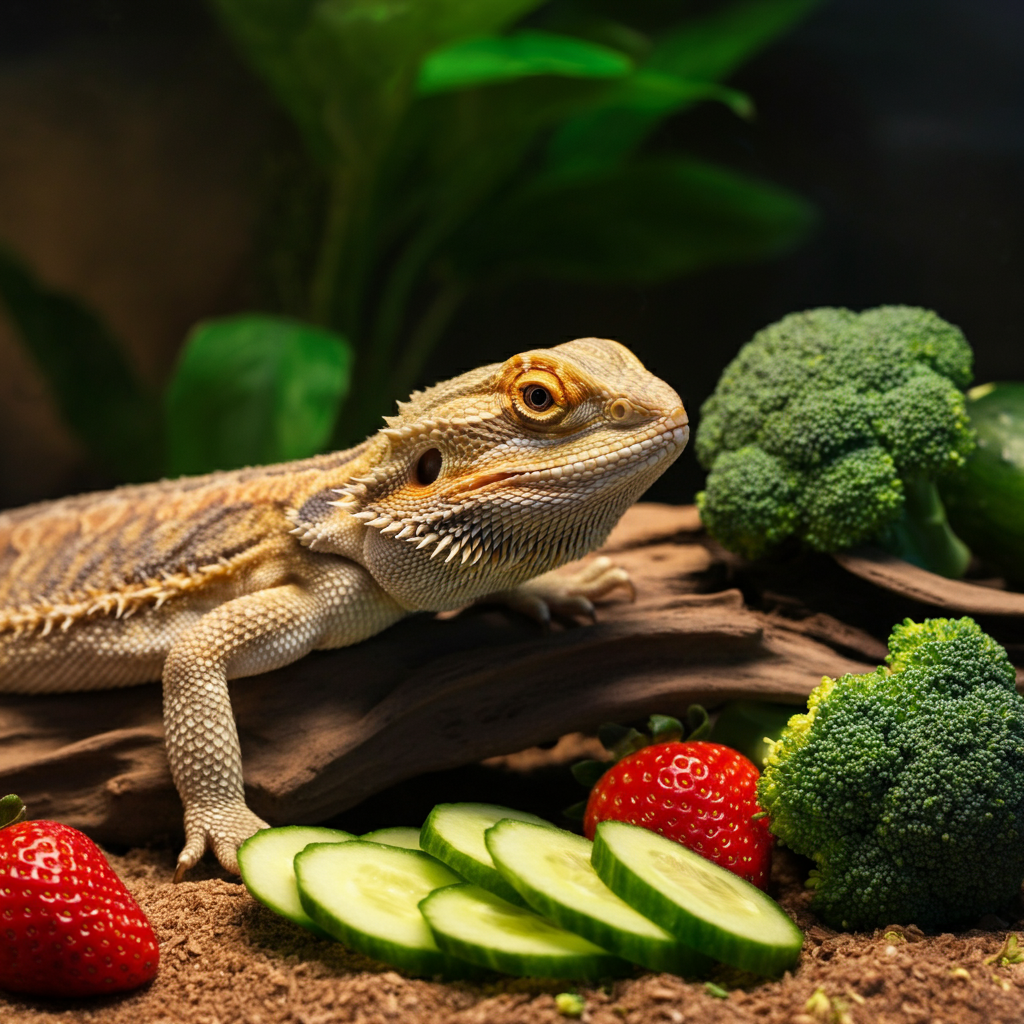Can Bearded Dragons Eat Cucumbers? What You Need to Know
Table of Contents
Can Bearded Dragons Eat Cucumbers? What You Need to Know
Bearded dragons are one of the most popular pets for reptile enthusiasts, and it’s not hard to see why. Their unique personalities, ease of care, and gentle nature make them ideal companions. However, being a responsible bearded dragon owner means understanding their dietary needs to keep them healthy and thriving.
One common question among bearded dragon caregivers is, “Can bearded dragons eat cucumbers?” Whether you’re a first-time owner or a seasoned reptile enthusiast, this post will guide you through everything you need to know about cucumbers as part of your bearded dragon’s diet. You’ll learn the benefits, risks, and appropriate alternatives to ensure your pet receives proper nutrition.
Understanding Bearded Dragons and Their Diet
The Importance of a Balanced Diet for Your Bearded Dragon
Bearded dragons are omnivorous reptiles, which means they require a mix of plant-based foods and protein-rich insects to stay healthy. A typical adult bearded dragon diet consists of about 80% vegetables and greens and 20% insects, while juveniles require more protein to support their rapid growth.
Providing a varied diet is crucial to avoid nutritional deficiencies and health issues. This means offering a range of safe fruits, vegetables, and insects in appropriate quantities. But not all foods are suitable for your scaly friend, so careful consideration is essential when planning their meals.
Can Bearded Dragons Eat Cucumbers?
The short answer is yes, bearded dragons can eat cucumbers, but only occasionally and in moderation. Let’s break it down further.
Nutritional Value of Cucumbers
Cucumbers are made up of about 95% water, making them excellent for hydration. They also contain small amounts of key nutrients like:
- Vitamin K – Supports blood clotting and bone health.
- Vitamin C – Boosts the immune system.
- Potassium – Supports muscle and nerve function.
However, cucumbers are low in essential nutrients like calcium and don’t provide significant nutritional value for bearded dragons. Because of this, they should not be a staple in their diet.
Benefits of Feeding Cucumbers to Bearded Dragons
1. Hydration Support
Cucumbers’ high water content can help keep your bearded dragon hydrated, especially if they’re prone to dehydration or don’t drink water from a bowl frequently. This makes cucumbers a useful treat on particularly hot days or when your pet seems less active.
2. A Low-Calorie Treat
If you’re looking for a light, low-calorie treat to mix into your pet’s diet occasionally, cucumbers can be a guilt-free option. Their refreshing texture may also be enjoyable for your dragon to munch on.
Risks and Considerations
1. Low Calcium Content and Imbalanced Ratio
One major drawback of cucumbers is their lack of calcium, which is an essential nutrient for maintaining strong bones and preventing metabolic bone disease (MBD). Furthermore, cucumbers have an imbalanced calcium-to-phosphorus ratio, which can hinder calcium absorption in the body over time if overfed.
2. Potential Overhydration
While hydration is important, too much water-rich food, like cucumbers, can cause digestive issues such as diarrhea. Overhydration can disrupt your dragon’s internal balance, so moderation is key.
3. Pesticides and Improper Preparation
Cucumbers can sometimes carry harmful pesticides or chemicals. Always wash them thoroughly and peel the skin if possible before feeding. Cutting the cucumber into small, manageable pieces is also essential to avoid choking hazards.
Quick Tip
Feed cucumbers once or twice a month as a treat, rather than as a core part of their diet.
Alternatives to Cucumbers in a Bearded Dragon’s Diet
To create a nutritionally balanced diet for your bearded dragon, you’ll need to offer a variety of vegetables, fruits, and protein sources. Here are some great alternatives to cucumbers that are safe and beneficial for your dragon.
Safe Vegetables for Bearded Dragons
- Collard Greens – High in calcium.
- Mustard Greens – Rich in vitamins A & C.
- Squash – A great source of fiber and beta-carotene.
- Bell Peppers – Provides antioxidants and vitamin C.
Fruits to Include in Moderation
- Strawberries – Can bearded dragons have strawberries? Yes, but occasionally, as they are high in natural sugars.
- Blueberries – Packed with antioxidants.
- Apples – Offer fiber and vitamins (remove seeds).
Don’t Forget Protein!
For their insect portion, include options like crickets, dubia roaches, or black soldier fly larvae. These are protein-rich and can be dusted with calcium powder to meet your dragon’s dietary needs.
Key Dietary Tips for Bearded Dragon Caregivers
- Vary the Menu: Avoid relying too heavily on a single food item. Diversity is essential for balanced nutrition.
- Calcium Supplementation: Invest in calcium powder with vitamin D3 to sprinkle on meals a few times a week.
- Consult an Expert: If you’re uncertain about your bearded dragon’s diet, speak with a reptile-savvy veterinarian for personalized guidance.
Keeping Your Bearded Dragon Healthy and Happy
Cucumbers can be a refreshing treat for your bearded dragon when offered sparingly, but they should not replace nutrient-rich staples like leafy greens and calcium-fortified veggies. By balancing their diet with safe vegetables, occasional fruits, and protein-packed insects, you can ensure your scaly companion thrives.
Remember, every bearded dragon is unique. If you’re unsure about introducing new foods, don’t hesitate to reach out to a reptile expert or veterinarian.
For more tips on bearded dragon nutrition, including answers to questions like “Can bearded dragons eat broccoli?” or “What fruits can bearded dragons eat?”, stay tuned to our blog!

